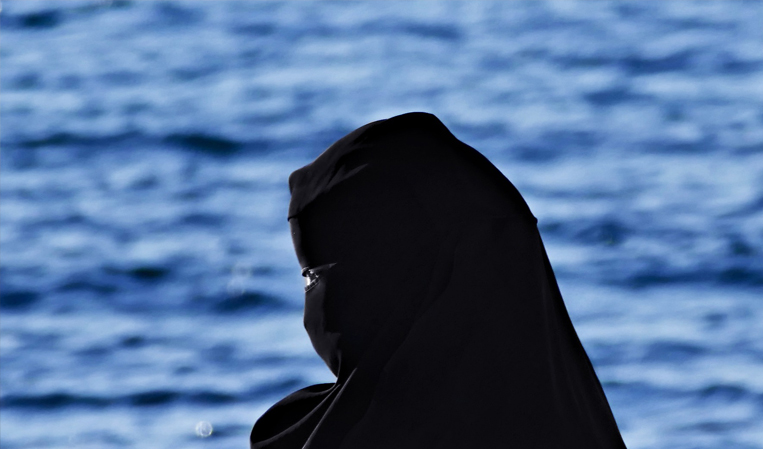وَقُلْ لِلْمُؤْمِنَاتِ يَغْضُضْنَ مِنْ أَبْصَارِهِنَّ وَيَحْفَظْنَ فُرُوجَهُنَّ وَلَا يُبْدِينَ زِينَتَهُنَّ إِلَّا مَا ظَهَرَ مِنْهَا وَلْيَضْرِبْنَ بِخُمُرِهِنَّ عَلَى جُيُوبِهِنَّ وَلَا يُبْدِينَ زِينَتَهُنَّ إِلَّا لِبُعُولَتِهِنَّ أَوْ آبَائِهِنَّ أَوْ آبَاءِ بُعُولَتِهِنَّ أَوْ أَبْنَائِهِنَّ أَوْ أَبْنَاءِ بُعُولَتِهِنَّ أَوْ إِخْوَانِهِنَّ أَوْ بَنِي إِخْوَانِهِنَّ أَوْ بَنِي أَخَوَاتِهِنَّ أَوْ نِسَائِهِنَّ أَوْ مَا مَلَكَتْ أَيْمَانُهُنَّ أَوِ التَّابِعِينَ غَيْرِ أُولِي الْإِرْبَةِ مِنَ الرِّجَالِ أَوِ الطِّفْلِ الَّذِينَ لَمْ يَظْهَرُوا عَلَى عَوْرَاتِ النِّسَاءِ
And say to the believing women that they restrain their eyes and guard their private parts, and that they disclose not their natural and artificial beauty except that which is apparent thereof, and that they draw their head-coverings over their bosoms, and that they disclose not their beauty save to their husbands, or to their fathers, or the fathers of their husbands or their sons or the sons of their husbands or their brothers, or the sons of their brothers, or the sons of their sisters, or their women, or what their right hands possess, or such of male attendants as have no sexual appetite, or young children who have no knowledge of the hidden parts of women.
Holy Quran 96: 2-6
Keyword Analysis
خمر Khumur (head-coverings): Khumur is the plural of khimār. Khimār is ھو ما تغطّی بہ المرأۃ رأسھا. i.e. the cloth with which a woman covers her head[1]; a woman’s head-covering; a piece of cloth with which a woman covers her head; also a man’s turban, because a man covers his head with it in like manner as a woman covers her head with her khimār[2].
جيوب Juyūb (bosoms): Juyūb is the plural of jaib which is derived from jāba. They say jābahu i.e. he made a hole in it; or rent it, or tore it. He cut it in like manner as one cuts a jaib or an opening at the neck and bosom of a shirt. Jaib is the opening at the neck and bosom of a shirt. The Arabs often carry things within the bosom of the shirt and hence the word is now applied by them to a pocket.[3]
Jaib also denotes the heart, or the bosom. So in the saying, ھو ناصح الجیب (huwa nāsihul jaib) i.e. he is pure, or sincere, of heart or bosom, or trustworthy, or faithful.[4]
Exegesis
Purdah is a fundamental Islamic commandment and has been clearly explained in the Holy Quran. People who do not read the Holy Book attentively are of the opinion that Allah has not laid much stress on it. It is such an explicit instruction and I have mentioned it two or three times earlier as well… What does the Holy Quran say about Purdah? It is a long verse and contains the command:
وَلَا يُبْدِينَ زِينَتَهُنَّ إِلَّا مَا ظَهَرَ مِنْهَا وَلْيَضْرِبْنَ بِخُمُرِهِنَّ عَلَى جُيُوبِهِنَّ
and that they disclose not their natural and artificial beauty except that which is apparent thereof, and that they draw their head-coverings over their bosoms.
وَلَا يُبْدِينَ زِينَتَهُنَّ إِلَّا لِبُعُولَتِهِنَّ أَوْ آبَائِهِنَّ أَوْ آبَاءِ بُعُولَتِهِنَّ أَوْ أَبْنَائِهِنَّ أَوْ أَبْنَاءِ بُعُولَتِهِنَّ
And then there is a long list; that “they should not disclose their beauty except to their fathers, their husbands and their sons.”
Now, because it is written therein that ‘the outer coverings be drawn over the bosoms’, some people proclaim that as the commandment is to cover the bosom, wearing a Dupatta or a scarf around the neck is enough. The command is ‘not to display your beauty’, which means that when you go out, the covering should be wide enough to cover the physical beauty of the whole body as well. At another place, covering of the head is also commanded. That is why throughout the Islamic world, wherever there is some concept of observing Purdah, the perception of covering the head is manifest. Everywhere, Hijab (head covering) or Niqab (face covering) or something of the like is used, a scarf may be worn or a wide wrap is worn. Thus, Allah has said,
وَلْيَضْرِبْنَ بِخُمُرِهِنَّ عَلَى جُيُوبِهِنَّ
“draw their head-coverings over their bosoms”, which means that the covering should be big enough to cover the head and the body. It is permissible to come in front of fathers, brothers and sons without this covering. Surely, when a woman comes in front of her father, brothers and sons, she is in a decent dress, but the face is uncovered. He added that the face can be uncovered in presence of fathers, brothers, sons and other Mahram relatives, but it should not be so when you go out. These days, wraps or shawls are not used, instead, Niqab, Burqa or coats are worn. This restriction is not rigid to the extent of causing suffocation by covering the nose tightly. Besides, the nose can remain uncovered to breathe easily, but lips and chin should be covered. Otherwise, use a big Chador (shawl) and wrap it as Allah has said to cover your head. Purdah happens easily on its own – a large Chador (shawl) easily veils a face. If a Burqa is worn for its ease, it should be such that complies with this command.
REFERENCES
[1] Aqrab al-Mawarid
[2] Arabic-English Lexicon by Edward William Lane
[3] Ibid
[4] Ibid

